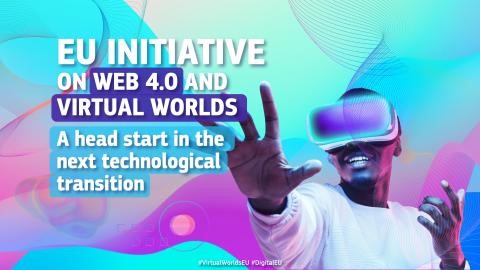On 11 July 2023, the Commission adopted a new strategy on Web 4.0 and virtual worlds to steer the next technological transition and ensure an open, secure, trustworthy, fair and inclusive digital environment for EU citizens, businesses and public administrations.
Virtual worlds will impact the way people live together, bringing both opportunities and risks that need to be addressed. The new strategy aims for a Web 4.0 and virtual worlds reflecting EU values and principles, where people’s rights fully apply and where European businesses can thrive.
The strategy is in line with the 2030 objectives of the Digital Decade policy programme and three of its key pillars of digitalisation: skills, business and public services. The fourth pillar, infrastructures, is addressed by the Commission’s connectivity package and its broader efforts on computing, cloud and edge capacities. It also addresses the openness and global governance of virtual worlds and Web 4.0 as a specific strands of action.
- Empowering people and reinforcing skills to foster awareness, access to trustworthy information and build a talent pool of virtual world specialists. By the end of 2023, the Commission will promote the guiding principles for virtual worlds, put forward by the Citizens’ Panel; and will develop guidance for the general public thanks to a ‘Citizen toolbox’ by the first quarter of 2024. As specialists on virtual worlds are essential, the Commission will work with Member States to set up a talent pipeline and will support skills development, including for women and girls, through projects funded by the Digital Europe Programme, and for creators of digital content through the Creative Europe
- Business: supporting a European Web 4.0 industrial ecosystemto scale up excellence and address fragmentation. Currently, there is no EU ecosystem bringing together the different players of the value chain of virtual worlds and Web 4.0. The Commission has proposed a candidate Partnership on Virtual Worlds under Horizon Europe, possibly starting 2025, to foster excellence in research and develop an industrial and technological roadmap for virtual worlds. To foster innovation, the Commission will also support EU creators and media companies to test new creation tools, bring together developers and industrial users, and work with Member States to develop regulatory sandboxes for Web 4.0 and virtual worlds.
- Government: supporting societal progress and virtual public services to leverage the opportunities virtual worlds can offer. The EU is already investing in major initiatives, such as Destination Earth (DestinE), Local Digital Twinsfor smart communities, or the European Digital Twin of the Ocean to allow researchers to advance science, industries to develop precision applications and public authorities to make informed public-policy decisions. The Commission is launching two new public flagships: “CitiVerse”, an immersive urban environment that can be used for city planning and management; and a European Virtual Human Twin, which will replicate the human body to support clinical decisions and personal treatment.
- Shaping global standards for open and interoperable virtual worlds and Web 4.0,ensuring that they will not be dominated by a few big players. The Commission will engage with internet governance stakeholders around the world and will promote Web 4.0 standards in line with the EU’s vision and values.
Source: European Commission | Press Corner (https://shorturl.at/dGN24)
